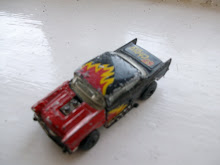My introduction to the works of Nick Kent came from reading a biography of Factory Records many years ago, where Tony Wilson claimed Kent fitted him up by inventing a quote that had him saying "Ian Curtis dying on me was the best thing that happened in my life".
Even from someone in love with the sound of his own voice as Wilson, I took his side of the story in that he never said it. I always assumed he'd loved Curtis too much to say something like that, no matter how many drugs he was on at the time. Therefore, Nick Kent was an arse. I'd heard all about The Dark Stuff, his collection of music writing but decided to ignore it. After all, this is the man Bowie dismissed as Nick "I'm as cool as Keef" Kent.
But with a voucher for a High Street record store burning a hole in my pocket, and the book going for all of £3, I decided I'd drop my prejudices and take a look. What I did read mainly confirmed what I suspected, yet with some kind of redemption for the author in there too. The Dark Stuff, it would seem, is all about musicians with a large appetite for drugs, drink and sex, from which they draw creativity to get on with their art.
The articles on the Rolling Stones seem to be the origin of this line of thought, which doesn't really cut any ice with this hack, as the Stones ceased to have any relevance to creativity from the early 70s and descended into the Freak Show of Nostalgia from which they've stayed ever since. The tales of getting wasted with Keith Richards are the worst kind of gonzo journalism: the back cover pic of Kent looked rake thin, long haired, leather trousered and with cigarette in hand would suggest that he never got over not being a rock star himself.
More pathetic is his article on Sid Vicious, entitled 'The Exploding Dim Wit'. Evidently, the writer never forgave that slap Sid gave him and concludes that Sid and Nancy had "at the age of 20 already wasted themselves beyond belief. Let them rot". Such bitterness is neither pretty or clever but not entirely surprising: he always seemed to prefer the Clash, possibly because they threw the Stones-esque shapes he loved, hence his putting the boot big time into Sandinista! for being some kind of betrayal.
The pieces on Morrissey/The Smiths, Sly Stone and Phil Spector are basic biographies of the subjects and offer little. But, but, but... Kent pulls the whole thing out of the mire was some outstanding work. 'The Last Beach Movie Revisited: The Life of Brian Wilson' is a tragic piece, showing one of the greatest songwriters of the 60s doped up to the point of having the mental capacity of a small child. He also captures Elvis Costello in his classic Angry Young Man phase, getting the "guilt and revenge are the only emotions I know about" line that would follow young Declan around for years.
Most poignant of all is an interview with Roy Orbison. Kent is, understandably, in awe of the man, stating "he looked perfect" at a time when the Big O's career was back on track after the best part of 20 years in the wilderness. Having being resurrected by the likes of David Lynch and Bruce Springsteen, hit the top with the Travelling Wilburys and recorded a new album, life looked good for the man. He states that "God has his plans, and I've got mine". Nine days after the interview, the man was dead.
"A modern classic, one of the few essential collections of writing on rock music"? Not a chance. Nick Kent is a decent writer who interviewed some of the most interesting and talented icons in 20th century pop music. Whatever the Dark Stuff is, it may well be more fun to actually engage in than read about.
Subscribe to:
Post Comments (Atom)

So many errors in the Smiths article. Let's just start by saying Wythenshawe is spelt Withenshawe and he refers to the song 'Jean' rather than 'Jeane'.
ReplyDelete